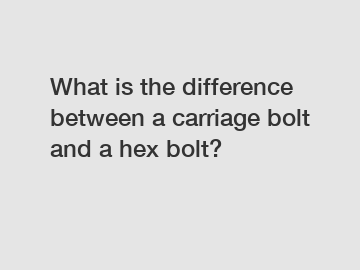What is the difference between a carriage bolt and a hex bolt?
Yipeng contains other products and information you need, so please check it out.
When it comes to construction and DIY projects, there are countless types of bolts and fasteners to choose from. One common question that often arises is the difference between a carriage bolt and a hex bolt. While both are essential for securing materials together, they have distinct characteristics that make them unique and suitable for different applications.
Carriage bolts, also known as coach bolts or round head square neck bolts, are designed with a rounded head and a square neck beneath the head. This square neck prevents the bolt from turning while tightening the nut, making them ideal for applications where a smooth and finished look is desired. Carriage bolts are commonly used in wood-to-wood connections, as well as in metal-to-wood connections.

On the other hand, hex bolts, also known as hex cap screws or hex head bolts, have a six-sided head with a flat top and a chamfered edge. Hex bolts are typically used with a nut to secure two or more materials together. They are available in various grades and strengths, making them suitable for a wide range of applications, including machinery, automotive, construction, and more.
One of the main differences between carriage bolts and hex bolts is their head design. Carriage bolts have a round, smooth head that sits flush against the material, giving a clean and finished appearance. Hex bolts, on the other hand, have a hexagonal head that protrudes from the surface, making them more visible and accessible for tightening and loosening.
Another key difference between carriage bolts and hex bolts is their installation method. Carriage bolts are typically inserted into pre-drilled holes and secured with a nut on the other side. The square neck of the carriage bolt prevents it from spinning while tightening the nut, making installation easier and more convenient. Hex bolts, on the other hand, are inserted through the material and secured with a nut on the opposite side. They require a socket or wrench to tighten the nut, providing a more secure and sturdy connection.
When it comes to strength and durability, both carriage bolts and hex bolts are available in various grades and materials. Carriage bolts are commonly made from low to medium carbon steel, while hex bolts are available in a wide range of materials, including stainless steel, alloy steel, and brass. The grade and material of the bolt determine its tensile strength, corrosion resistance, and overall performance.
In terms of versatility, hex bolts are more commonly used in a wide range of applications due to their high strength and durability. They are available in a variety of sizes, lengths, and finishes, making them suitable for almost any project. Carriage bolts, on the other hand, are more specialized and are commonly used in woodworking and furniture assembly.
When choosing between carriage bolts and hex bolts for your project, consider the specific requirements, material compatibility, and aesthetic preferences. Carriage bolts are ideal for applications where a clean and finished appearance is desired, while hex bolts are more versatile and offer higher strength and durability.
In conclusion, both carriage bolts and hex bolts are essential fasteners for securing materials together in construction, woodworking, automotive, and other industries. While they may appear similar at first glance, they have distinct characteristics that make them suitable for different applications. By understanding the differences between carriage bolts and hex bolts, you can choose the right fastener for your project and ensure a secure and lasting connection.
If you want to learn more, please visit our website.
If you are looking for more details, kindly visit wedge type strain clamp.

Comments
0